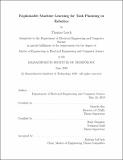Explainable machine learning for task planning in robotics
Author(s)
Leech, Thomas(Thomas F.)
Download1129259647-MIT.pdf (2.264Mb)
Other Contributors
Massachusetts Institute of Technology. Department of Electrical Engineering and Computer Science.
Advisor
Daniela Rus and Mark Donahue.
Terms of use
Metadata
Show full item recordAbstract
This thesis presents an extension and two applications of Logic-based Value Iteration Networks (LVIN); a learning framework that combines imitation learning and logical automata. Many robotics problems motivate an imitation learning approach because of the high complexity of rules the robot must follow. Machine learning approaches pose a verifiability issue since the resulting model is generally a massive neural network with hidden states which are not understood by humans. LVIN learns to represent problems as compact finite state automata (FSA) with human-interpretable logic states. This allows for humans to understand and even manipulate the behavior of the learned model, adding trust and flexibility to robotics applications trained with LVIN. This work demonstrates two different applications of LVIN to robotics. The first is a proof of concept example of packing a lunchbox or work bag where user preferences can be used to manipulate behavior of the robot without re-training. The second is a more complex example of searching cabinets for a potential explosive device. In the second example, we present a method for adding non-determinism to planning in LVIN as well as demonstrate the ability for error correction in the robot's behavior.
Description
This electronic version was submitted by the student author. The certified thesis is available in the Institute Archives and Special Collections. Thesis: M. Eng., Massachusetts Institute of Technology, Department of Electrical Engineering and Computer Science, 2019 Cataloged from student-submitted PDF version of thesis. Includes bibliographical references (pages 71-73).
Date issued
2019Department
Massachusetts Institute of Technology. Department of Electrical Engineering and Computer SciencePublisher
Massachusetts Institute of Technology
Keywords
Electrical Engineering and Computer Science.